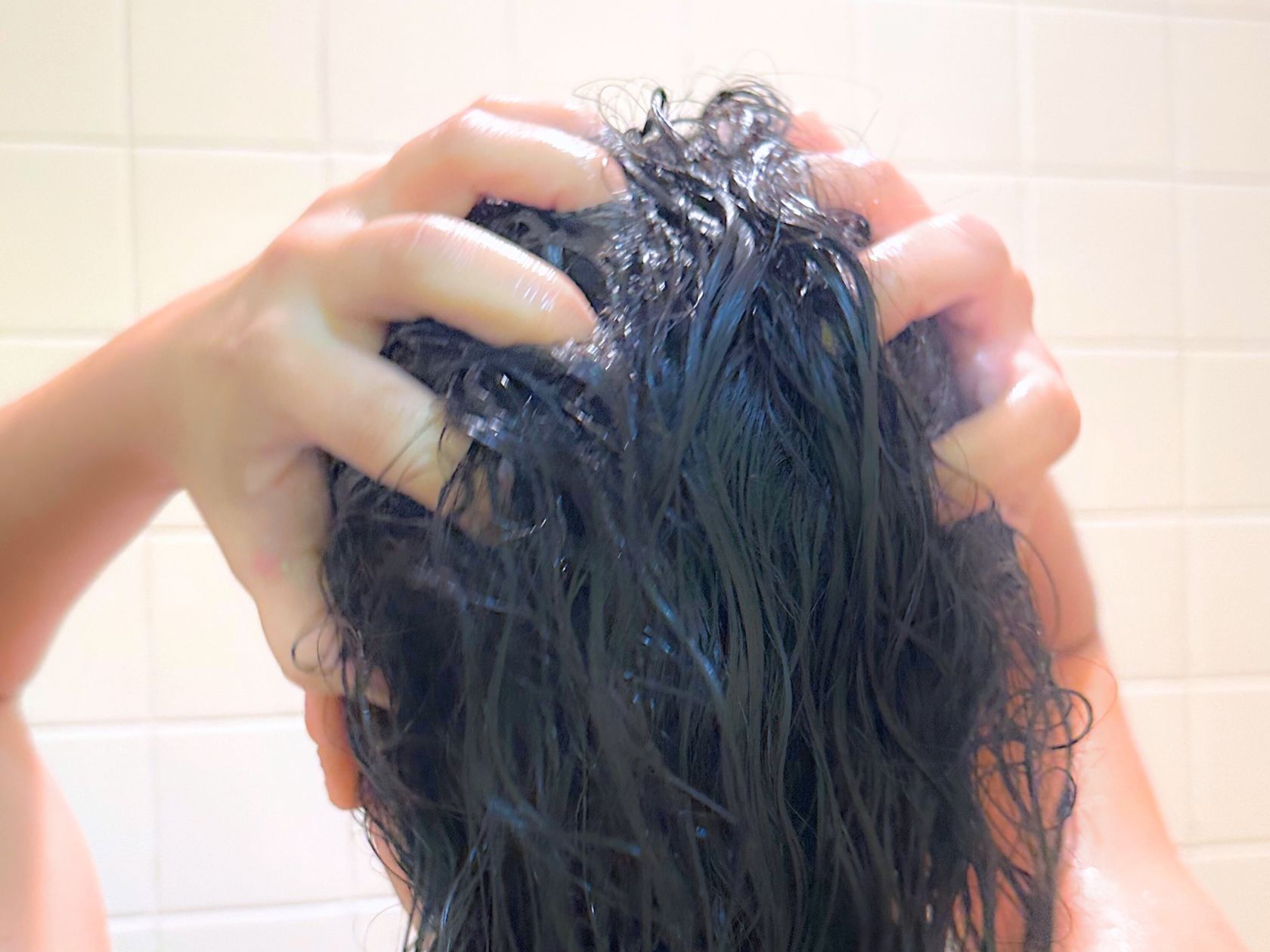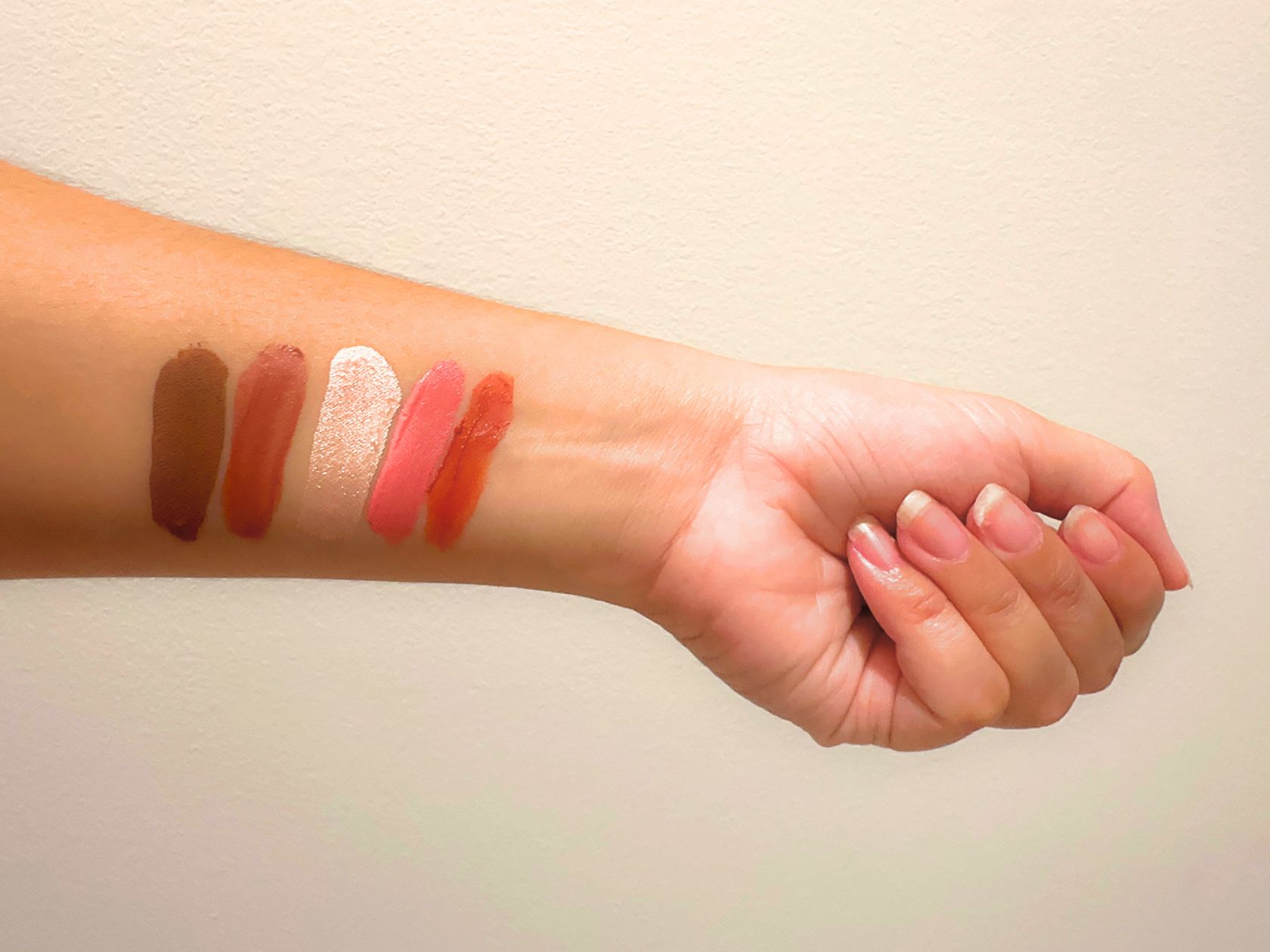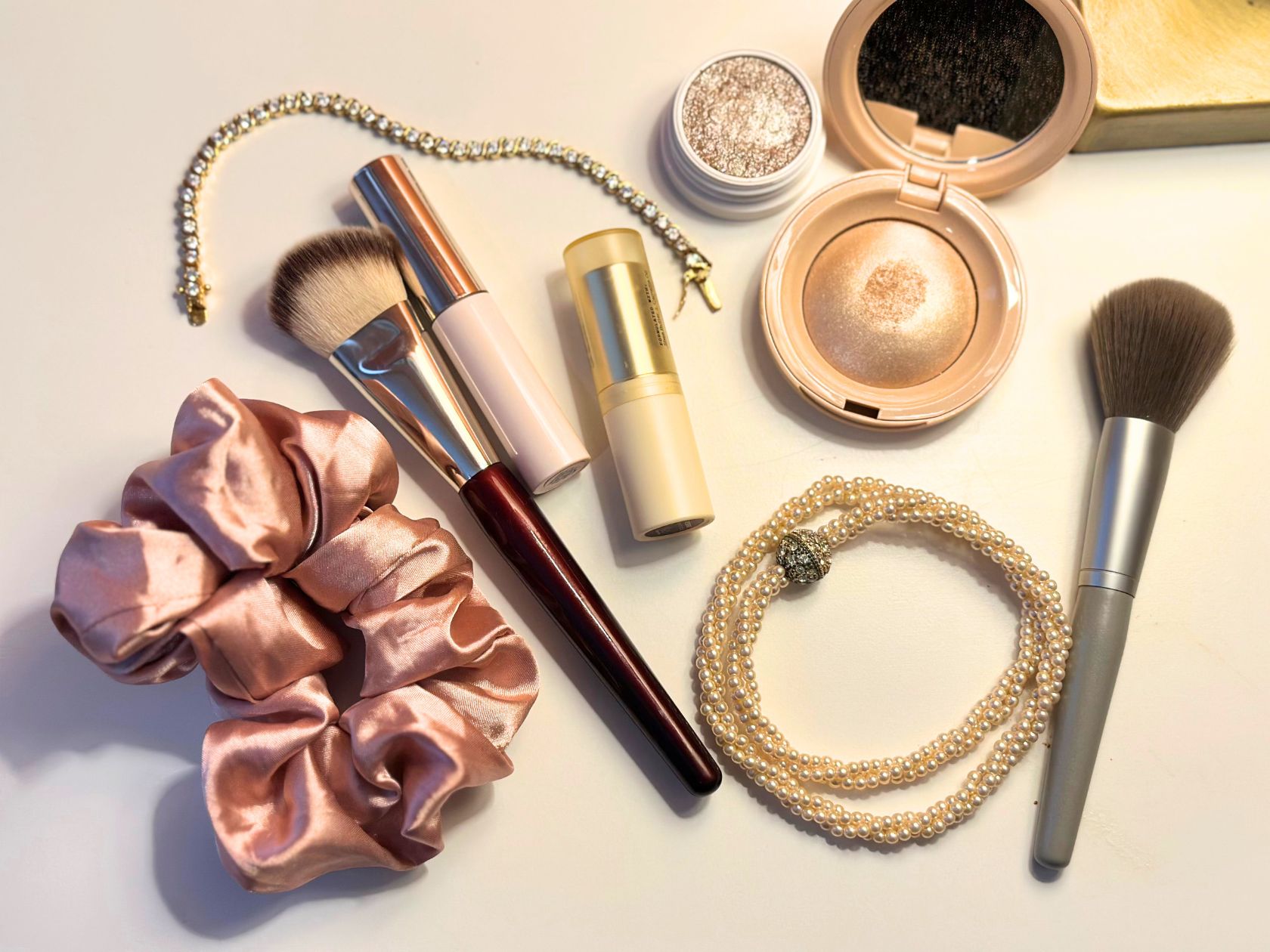I originally titled the post “Everything you need to know about shampoo” but then I realized that was probably an overstatement. It overstated my own knowledge and expertise, and also what could reasonably be covered in a casual blog post like this.
So instead, I’ve decided to focus this post on some key pieces of information about shampoo. I hope this helps you feel empowered when washing your hair. Let’s get right into it.
Wash your scalp, not your hair
If you have short hair, then washing your scalp and washing your hair are basically the same thing. But if your hair is long, then the distinction between washing your scalp and washing your hair is important. And when I refer to long hair, I’m including hair that is often considered short, such as chin-length hair. The point is that your hair has grown long enough that there’s a difference between the hair at your scalp (your roots) and the ends.
The point of shampoo isn’t really to wash your hair. It’s confusing, because we always say that we wash our hair. But unless your hair is caked with mud (or, more realistically, overburdened by hair products) then you really don’t need to wash your hair.
Your scalp, however, needs to be washed regularly, just like the rest of your body and skin. When you don’t wash your scalp, it can lead to oil, or sebum, building up at the roots of your hair. Not only does sebum build up in your hair, but dead skin cells can too. If you are active and are sweating, then you can add sweat to the buildup at your scalp. And if you use dry shampoo or other hair products at the roots—more buildup.
Washing your scalp helps remove any buildup there. If you have longer hair, you can let the shampoo run through the lengths of your hair as you rinse out the shampoo. And for most people, this makes sense. We often don’t have dirty ends the way we have greasy roots, so it makes sense to target the efforts of cleaning on the roots, rather than the ends.
If your hair is caked with mud or overburdened by hair products, then you may want to gently massage shampoo into your hair strands. The key is to treat the lengths of your hair gently while shampooing, since wet hair is more fragile than dry hair.
And I think this is a good way to approach taking care of yourself in general. Treat yourself gently and preciously, including your hair.
How often should you wash your hair?
The American Academy of Dermatology Association has some general guidelines for how often to wash children’s hair based on their age and hair pattern (such as straight vs. curly). This can help you get a sense for how often you should wash your hair as a presumed adult. But I think the real answer is: you should wash your hair as often as you need to for a healthy scalp.
Hair grows from the scalp, not the ends. Maintaining a healthy scalp will help you maintain healthy hair. But even determining your hair type or scalp type isn’t enough to form a definitive answer for how often you should wash your scalp.
You basically want to wash your scalp as often as it needs to remove the buildup of sebum, dead cells, sweat, or hair products. This means you may want to wash your scalp if you really sweated it out at the gym, even if you just washed your hair (scalp) the day before. Or you may find that your scalp gets drier or oilier seasonally, so you may need to wash your scalp more frequently in some seasons and less in others.
There is no one answer to rule them all when it comes to how frequently you should shampoo. You should do what works for you, and adjust that frequency as needed.
Can shampoo damage your hair?
Some people argue that shampoo can be damaging to your hair, so they recommend that you avoid or significantly reduce how often you shampoo your hair. Some of these people will even argue that you shouldn’t use shampoo at all, and instead use some expensive alternative to shampoo, or some dodgy DIY “shampoo.”
A lot of this comes from some mistaken ideas about how shampooing damages your hair, but the truth is that shampooing is probably not damaging your hair. Let’s look at each of these ideas in more detail.
Shampoos “strip” your hair
Shampoos, like most cleaners and soaps, contain chemicals that remove oil and dirt. You may remember “like dissolves like”—that’s the basic principle of shampoos. Sebum, sweat, and hair product residue aren’t water soluble. If they were, you could just wash it away with water. Since they’re not, shampoo contains chemicals called surfactants. Surfactants are both water-soluble and lipid-soluble, which means that oils will bind to the lipid-soluble part of the chemical, and then be washed away with water.
That’s how you get a clean scalp!
But your hair strands have an oily film, or coating. Shampoo is not going to differentiate between the excess sebum on your scalp and the more desirable oil coating the rest of your hair. Some people conclude that shampoo can “strip” the oil from your hair, leading to hair that is “dried out” and therefore prone to damage.
However, the natural oil coating on your hair isn’t perfectly preserving your hair from damage. (Not to get too existential, but nothing can protect anything perfectly from any type of damage.) Plus, the natural oil coating can wear away due to natural environmental factors—wind, rain, sun exposure, heat, cold.
This is partly what conditioner is for, especially for people with longer hair. Conditioner supplements that protective coating to your hair; for people with really damaged hair, conditioner may be the primary protective coating for your hair. Like the natural coating, conditioner also wears off, but it can at least act as a stopgap until you condition your hair again.
It’s possible that you could experience dry hair from a shampoo that’s really good at cleaning. If you are experiencing overdrying effects from your shampoo, you may want to try:
- Using a different shampoo
- Using a more effective conditioner
- Pre-conditioning the ends of your hair before shampoo
Hygral fatigue
Hygral fatigue isn’t really about shampooing your hair per se. Instead, it’s about the effect of constantly wetting your hair and leaving your hair wet for extended periods of time. When your hair is saturated with water, the water swells your hair strands and lifts the cuticle too. Then, as your hair dries, the strands contract and the cuticle flattens.
However, if you’re frequently wetting your hair, then this could stress your hair to the point where the hair loses its protective layers, especially the cuticle, exposing the center of the hair strand. And since you need water in order to be able to spread shampoo effectively over your scalp and rinse it away, shampooing is a possible cause for hygral fatigue.
Dr. Michelle Wong, the creator behind Lab Muffin Beauty Science, recently made a video about hygral fatigue and hydration in hair, which you can watch here. Her conclusion is that hygral fatigue is a myth, and that water affects hair neutrally.
But for the sake of argument, let’s suppose that hygral fatigue is a problem for your hair. If so, shampoo is still not the problem; water is the problem. It’s just that you use shampoo with water for it to be effective. Even if hygral fatigue could damage your hair, you would still need to clean your scalp.
Pre-conditioning the ends of your hair before shampoo could help prevent hair from being damaged by hygral fatigue. But blow drying your hair could also prevent hygral fatigue just by drying your hair more quickly. This is especially true for people with thick or dense hair that can take literal hours to air-dry.
You can use a blow dryer in a relatively gentle way that won’t cause heat damage. Keeping the blow dryer a few inches away from your head, using lower heat settings, and using a protective leave-in conditioner can all help you mitigate any possible damage from blow drying. These simple behaviors are good for your hair whether or not hygral fatigue is real. But since hygral fatigue is likely a myth, you can rest assured that it’s ok for you to wash your hair as often as you need to.
Mechanical damage
In my opinion, this is the most likely cause of damage from shampooing. Like with hygral fatigue, it isn’t really the shampoo that’s the problem. In this case, you are the problem. Sorry.
Mechanical damage is caused by things like friction, pulling, twisting, or even breaking your hair. While you can cause mechanical damage to your hair at any point, your hair is especially prone to mechanical damage when it’s wet. Your hair is weaker and stretchier when it’s wet. That makes it more likely to snap or break.
You can reduce your chances of causing mechanical damage in a few ways:
- I’ve already mentioned focusing on washing your scalp. Massaging your scalp directly with your fingers can help you avoid putting too much stress on your actual strands.
- Use gentle motions when washing your hair, rather than vigorously scrubbing at the surface of your hair.
- Pat or gently squeeze your hair dry instead of rubbing it violently with a towel.
- Gently detangle your hair, whether while its wet or dry. Consider using a leave-in conditioner or detangler if your rinse-out conditioner isn’t enough to detangle your hair on its own, or even using your hands to gently separate knots.
Are sulfate-free shampoos better than shampoos with sulfates?
Whether you research beauty information on the internet or not, you’ve probably seen some shampoos with a marketing label that reads “sulfate-free.” As with all “free from” marketing, putting the “sulfate-free” label often makes people believe that the product is superior in some way to other products. In this case, it leads people to believe that sulfate-free shampoo is somehow better than sulfate-based shampoo.
In this video by Dr. Michelle Wong, she goes over the complicated nature of hair science and also sulfates. But the short of it is—no, sulfate-free shampoos are not better than sulfate-based shampoos. And, for what it’s worth, sulfate-based shampoos are not better than sulfate-free shampoos.
There are good and bad shampoos in both categories. There are some sulfate-free shampoos that do a good job cleaning your scalp. There are also bad sulfate-free shampoos that do nothing to clean your scalp. And the same is true for sulfate-based shampoos.
Luckily, you don’t need to worry about whether your shampoo has sulfates or not. You just want to make sure you’re using the right shampoo for your scalp needs. From there, you want to avoid damaging your hair by being overzealous in your scrubbing or drying, and use an appropriate conditioner to take care of your hair ends.
As I said in the beginning, I hope that this will help you feel more confident when it comes to what you should know about shampoo. While there is some hair science to consider, ultimately, you can apply what I described in my beauty empiricism post. Trust your own experience and observations and do what works best for you.




